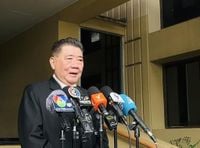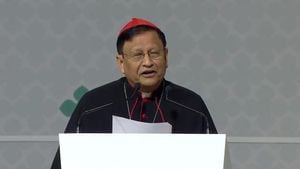On April 18, 2025, at 8:40 a.m., Mr. Phumtham Wechayachai, the Deputy Prime Minister and Minister of Commerce, addressed the media regarding the ongoing concerns surrounding Mr. Smatthiphan Hleenurattanakorn, commonly known as Peach, the son of Mr. Kriangkrai Hleenurattanakorn, also referred to as Mr. Bew, from the Bhumjaithai Party. The discussion arose after images surfaced showing Peach in close proximity to former Prime Minister Thaksin Shinawatra and current Prime Minister Ms. Phaethongthan Shinawatra during a recent Buddhist ordination ceremony. Mr. Phumtham emphasized the need to separate personal relationships from legal matters, stating, "This matter must be separated. Personal relationships are one thing, but legal matters must be addressed according to the law. If there are legal issues, the authorities must investigate accordingly and without interference. There is no need for concern about this issue; we are not involved at all."
Mr. Phumtham's comments came in response to concerns raised by the spokesperson of the Palang Pracharath Party, who expressed unease over the perceived closeness between Peach and the Shinawatras, suggesting potential conflicts of interest. Mr. Phumtham clarified that the presence of Thaksin and Phaethongthan at the ordination was a routine matter, stating, "Thaksin did not attend just because of Peach; he has been invited to many events by party members. Mr. Bew is a member of the Pheu Thai Party, and his eldest son is an MP for the party. When an MP has a family event like ordination, it is customary to invite Thaksin, who has been a founding member of Thai Rak Thai and now the Pheu Thai Party, and Phaethongthan, who is the party leader. This is a normal practice, not something special or unusual. We shouldn’t view this as a special relationship. Every party does this."
In his remarks, Mr. Phumtham sought to dispel the notion that there was anything inappropriate about the situation, urging the public and the media to refrain from jumping to conclusions. He noted, "This morning, I saw some news reports that suggested there was a special relationship, causing unnecessary concern. While everyone has the right to be concerned, we must trust that this is not being treated as a special case. I have made it clear that we have never interfered in such matters. I ask all officials not to feel pressured regarding their investigations simply because someone is a member of the Pheu Thai Party. They must proceed according to the law without any bias. However, I personally cannot confirm whether Mr. Smatthiphan is a member of the Pheu Thai Party, but his father and brother are members."
When pressed about the societal implications of the case, particularly regarding the influence of powerful individuals in legal proceedings, Mr. Phumtham reassured the public that there would be no preferential treatment. He stated, "Those with influence who create problems for government officials in this manner should not be involved or close to the case. The investigation will take place in the public interest. Officials must not act inappropriately. There is no reason to worry about this matter. No one can distort the truth without the public noticing. Political parties will not engage in such actions."
The backdrop of Mr. Phumtham's comments is a broader societal concern regarding the intersection of power, influence, and justice in Thailand. The case of Mr. Smatthiphan has raised eyebrows not only due to his familial connections but also because of the implications it carries for the integrity of legal processes in the country. Critics have pointed to the potential for conflicts of interest when individuals with political ties face legal scrutiny. This situation is particularly sensitive in light of the ongoing scrutiny of political figures and their conduct, as the Thai public remains vigilant about corruption and accountability.
As the investigation unfolds, the government faces the challenge of maintaining public trust while navigating the complexities of political relationships and legal obligations. Mr. Phumtham's insistence on separating personal connections from legal matters is a crucial stance that he hopes will reassure the public. However, skepticism remains, particularly among those who question whether true impartiality can be achieved when influential figures are involved.
In conclusion, the case of Mr. Smatthiphan Hleenurattanakorn is emblematic of the broader issues facing Thailand as it grapples with the legacy of political influence and the rule of law. While Mr. Phumtham has called for a clear distinction between personal relationships and legal responsibilities, the public's confidence in the system will ultimately depend on how transparently and effectively the authorities handle this case and similar ones in the future.




